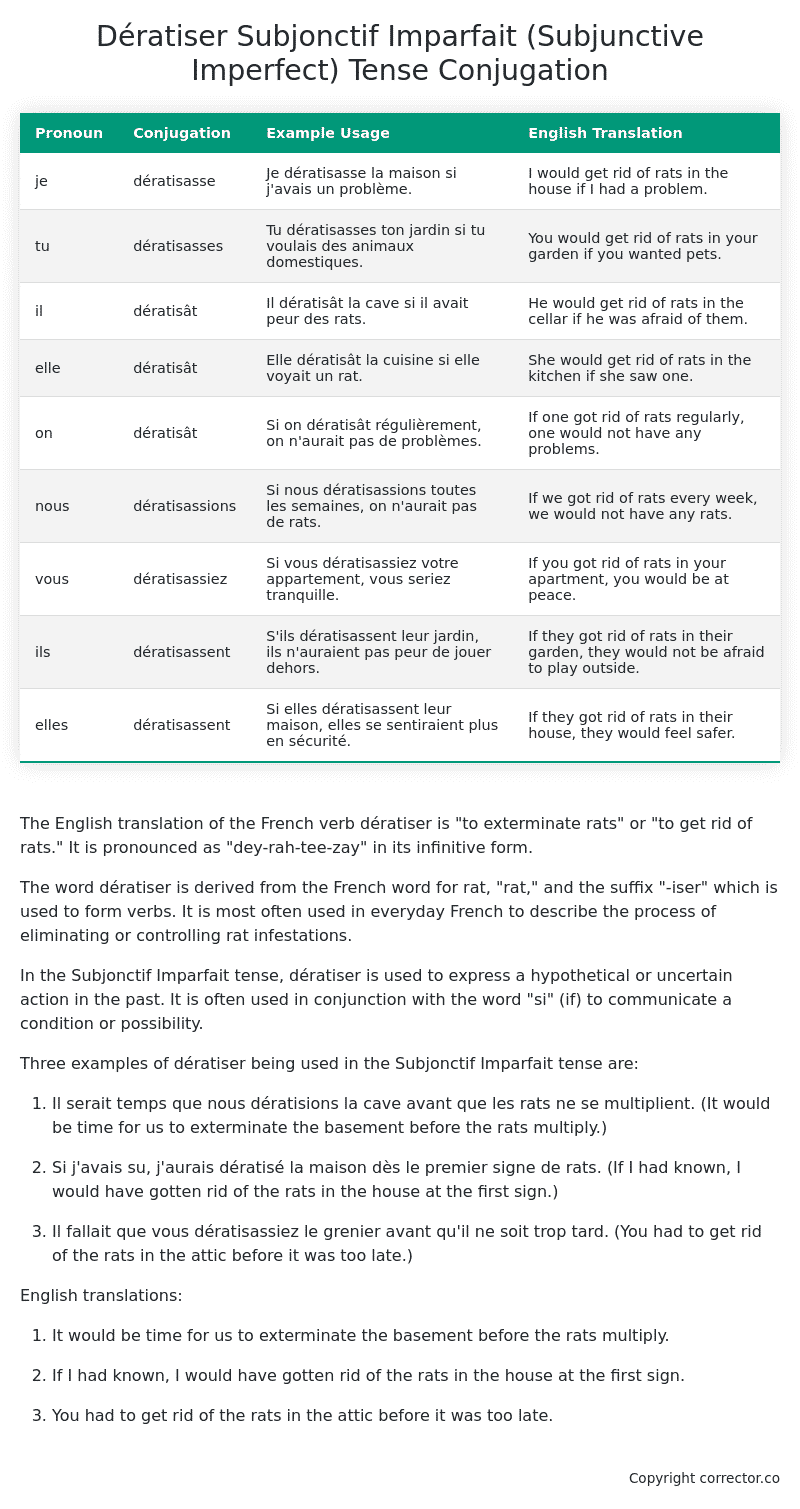Subjonctif Imparfait (Subjunctive Imperfect) Tense Conjugation of the French Verb dératiser
Introduction to the verb dératiser
The English translation of the French verb dératiser is “to exterminate rats” or “to get rid of rats.” It is pronounced as “dey-rah-tee-zay” in its infinitive form.
The word dératiser is derived from the French word for rat, “rat,” and the suffix “-iser” which is used to form verbs. It is most often used in everyday French to describe the process of eliminating or controlling rat infestations.
In the Subjonctif Imparfait tense, dératiser is used to express a hypothetical or uncertain action in the past. It is often used in conjunction with the word “si” (if) to communicate a condition or possibility.
Three examples of dératiser being used in the Subjonctif Imparfait tense are:
-
Il serait temps que nous dératisions la cave avant que les rats ne se multiplient. (It would be time for us to exterminate the basement before the rats multiply.)
-
Si j’avais su, j’aurais dératisé la maison dès le premier signe de rats. (If I had known, I would have gotten rid of the rats in the house at the first sign.)
-
Il fallait que vous dératisassiez le grenier avant qu’il ne soit trop tard. (You had to get rid of the rats in the attic before it was too late.)
English translations:
-
It would be time for us to exterminate the basement before the rats multiply.
-
If I had known, I would have gotten rid of the rats in the house at the first sign.
-
You had to get rid of the rats in the attic before it was too late.
Table of the Subjonctif Imparfait (Subjunctive Imperfect) Tense Conjugation of dératiser
| Pronoun | Conjugation | Example Usage | English Translation |
|---|---|---|---|
| je | dératisasse | Je dératisasse la maison si j’avais un problème. | I would get rid of rats in the house if I had a problem. |
| tu | dératisasses | Tu dératisasses ton jardin si tu voulais des animaux domestiques. | You would get rid of rats in your garden if you wanted pets. |
| il | dératisât | Il dératisât la cave si il avait peur des rats. | He would get rid of rats in the cellar if he was afraid of them. |
| elle | dératisât | Elle dératisât la cuisine si elle voyait un rat. | She would get rid of rats in the kitchen if she saw one. |
| on | dératisât | Si on dératisât régulièrement, on n’aurait pas de problèmes. | If one got rid of rats regularly, one would not have any problems. |
| nous | dératisassions | Si nous dératisassions toutes les semaines, on n’aurait pas de rats. | If we got rid of rats every week, we would not have any rats. |
| vous | dératisassiez | Si vous dératisassiez votre appartement, vous seriez tranquille. | If you got rid of rats in your apartment, you would be at peace. |
| ils | dératisassent | S’ils dératisassent leur jardin, ils n’auraient pas peur de jouer dehors. | If they got rid of rats in their garden, they would not be afraid to play outside. |
| elles | dératisassent | Si elles dératisassent leur maison, elles se sentiraient plus en sécurité. | If they got rid of rats in their house, they would feel safer. |
Other Conjugations for Dératiser.
Le Present (Present Tense) Conjugation of the French Verb dératiser
Imparfait (Imperfect) Tense Conjugation of the French Verb dératiser
Passé Simple (Simple Past) Tense Conjugation of the French Verb dératiser
Passé Composé (Present Perfect) Tense Conjugation of the French Verb dératiser
Futur Simple (Simple Future) Tense Conjugation of the French Verb dératiser
Futur Proche (Near Future) Tense Conjugation of the French Verb dératiser
Plus-que-parfait (Pluperfect) Tense Conjugation of the French Verb dératiser
Passé Antérieur (Past Anterior) Tense Conjugation of the French Verb dératiser
Futur Antérieur (Future Anterior) Tense Conjugation of the French Verb dératiser
Subjonctif Présent (Subjunctive Present) Tense Conjugation of the French Verb dératiser
Subjonctif Passé (Subjunctive Past) Tense Conjugation of the French Verb dératiser
Subjonctif Imparfait (Subjunctive Imperfect) Tense Conjugation of the French Verb dératiser (this article)
Subjonctif Plus-que-parfait (Subjunctive Pluperfect) Tense Conjugation of the French Verb dératiser
Conditionnel Présent (Conditional Present) Tense Conjugation of the French Verb dératiser
Conditionnel Passé (Conditional Past) Tense Conjugation of the French Verb dératiser
L’impératif Présent (Imperative Present) Tense Conjugation of the French Verb dératiser
L’infinitif Présent (Infinitive Present) Tense Conjugation of the French Verb dératiser
Struggling with French verbs or the language in general? Why not use our free French Grammar Checker – no registration required!
Get a FREE Download Study Sheet of this Conjugation 🔥
Simply right click the image below, click “save image” and get your free reference for the dératiser Subjonctif Imparfait tense conjugation!

Dératiser – About the French Subjonctif Imparfait (Subjunctive Imperfect) Tense
Formation
Common Everyday Usage Patterns
Interactions with Other Tenses
Subjonctif Présent
Indicatif Passé Composé
Conditional
Conditional Perfect
Summary
I hope you enjoyed this article on the verb dératiser. Still in a learning mood? Check out another TOTALLY random French verb conjugation!


